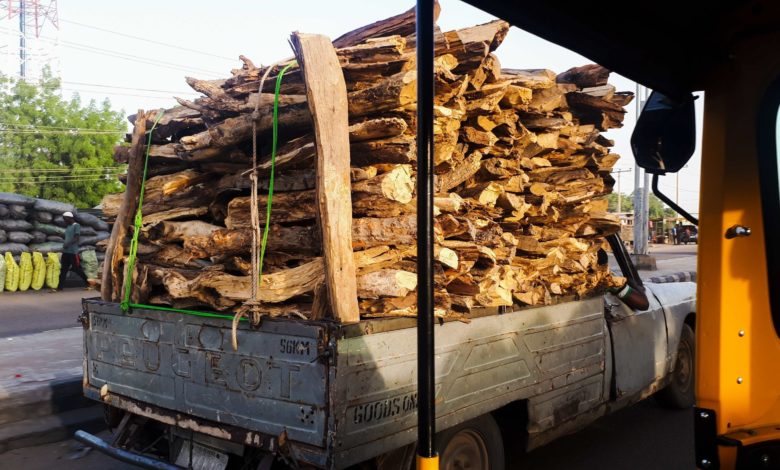Faced With Insurgency, Firewood Sellers in Borno Opt For New And Green Livelihood

Firewood and charcoal are the primary sources of domestic energy for most low-income communities in Nigeria. All the cookings are fueled by firewood and charcoal.
The sellers make brisk businesses all seasons. To feed the supply chain, trees are frequently felled. In the process, deforestation is escalated across the state.
As trucks filled with firewood move to markets and communities, they leave behind a trail of environmental degradation.
Humangle spoke with firewood dealers in Maiduguri, Borno State, Northeastern Nigeria, on the environmental impact of their trade.
Safiyanu Ibrahim said the business has been affected by the insurgency. With terrorists and state actors locked in gunfire across the terrains, forests and bushes it is never an option to venture into the wilds to fell trees for firewood and charcoals.
HumAngle was told that Boko Haram has increasingly targeted loggers and firewood collectors. For instance, in February 2019, the insurgents reportedly killed 18 firewood collectors as they explored the forest in Koshebe, Jere Local Government Area.
A similar incident occurred in Monguno when 14 firewood collectors were found dead at Duwabayi village near a garrison town, suspected to have been victims of the murderous activities of the Boko Haram fighters.
Similarly, in January 2018, Boko Haram killed at least 20 loggers collecting firewood at Kaje village, near Maiduguri, the Borno state capital, a civilian militia leader told AFP.
Also, on December 30, 2017, another 25 loggers were shot dead at Maiwa village, about 3 kilometres from Kaje, and three truck-loads of firewood were burnt.
Ibrahim told Humangle, that firewood dealers now rely on supplies from Bauchi and Yobe States to meet demands.
He added that prior to the escalation of the conflict, firewood dealers participated in tree planting exercises but were only able to do that in places considered very safe now.
Idrisa Hassan shared similar thoughts on the impact of insecurity and contribution of firewood sellers in curbing deforestation in the state.
“Insecurity has affected our business of collecting firewood or making charcoal. We rely on supplies from Yobe and Bauchi states and sometimes from people cutting down trees in their homes to make firewood,” Hassan told HumAngle.
“Venturing as far as five kilometres into the forest areas is dangerous. Is it the state security forces or the insurgents that will allow that?” he questioned.
Hassan says, the state government recently brought seedlings for them to plant and the firewood association also requested for access to more land space to plant more trees.
In response to the impact of desertification and deforestation, the State Government has set up nurseries across the state to support the planting of millions of trees.
The project will complement the federal government’s great green wall programme to restore degraded land in 11 states including Borno.
Peter Ayuba, the Director of Forestry and Wildlife in Borno State, told HumAgle that the state government was collaborating with firewood dealers to enlighten them on the dangers of felling trees and in the process encourage them to seek alternative livelihood.
According to him, the state is raising one million seedlings each for three years to plant economic and forestry trees.
The green wall project in the state has already commenced with trees planted in locations such as Maiduguri – Magumeri axis, Maiduguri – Konduga axis and Auno- Jakana.
Ayuba explained that the State government is also in the process of setting up orchards in areas that are safe such as the university environment and at the industrial layouts.
At a recent tree planting event with firewood dealers in the state, the state commissioner of environment Modu Buba Walama, spoke to dealers on the impact of logging and the need to develop alternatives.
Boko Haram’s decade-long insurgency has claimed over 20,000 people and displaced 2.6 million from their homes, sparking a dire humanitarian crisis in the region.
Support Our Journalism
There are millions of ordinary people affected by conflict in Africa whose stories are missing in the mainstream media. HumAngle is determined to tell those challenging and under-reported stories, hoping that the people impacted by these conflicts will find the safety and security they deserve.
To ensure that we continue to provide public service coverage, we have a small favour to ask you. We want you to be part of our journalistic endeavour by contributing a token to us.
Your donation will further promote a robust, free, and independent media.
Donate HereStay Closer To The Stories That Matter




